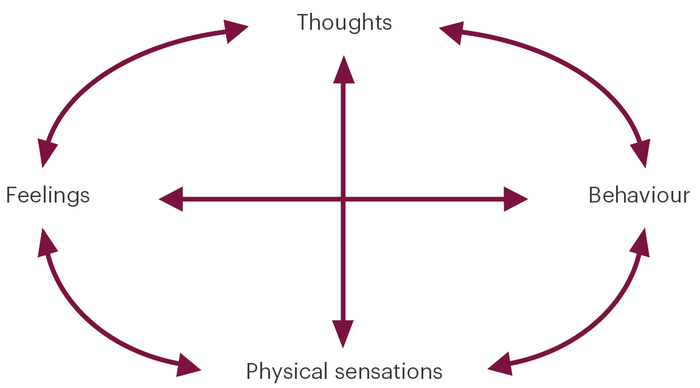Myelodysplastic syndromes (MDS) psychological impact
Myelodysplastic syndromes (MDS): thoughts, feelings and behaviour
There is a link between thoughts, feelings, physical feelings and behaviour (the actions we take, or don’t take, to cope).
It is hard to directly ‘access’ and change an emotion, whereas thoughts and behaviours and, to some extent, physical states, are more easily changed. This can help to improve emotional feelings. It is particularly effective to change negative thoughts and thinking patterns. In short, the way we think affects the way we feel.

Managing thoughts
Writing negative thoughts and worries down can be helpful. You will notice that some of them are ‘valid’ (this means understandable and acceptable) given your situation, but some of them are ‘catastrophic’ (meaning they predict the worst case scenario) or are very ‘black and white’ (meaning things are all good or all bad).
Here are some examples: “because of this illness, my life’s ruined”; “I know the treatment won’t work”; “nothing ever goes right for me”; “everything’s awful”; “there’s no hope”; “I must be a bad person”. Take a step back and ask yourself whether those thoughts are facts or opinions. Say to yourself “is there another way of looking at this?”, or “is that actually what my medical team said to me?”
Write down alternative, more helpful thoughts next to the original worries. This is not the same as ‘positive thinking’, as you may have some valid concerns; it is about maintaining perspective, having a balanced view, and not getting too caught up in your thoughts.
Changing behaviour
Some types of behaviour make emotional distress worse. For example, when people avoid activity, socialising and exercise (even doing basic things like having a shower and getting dressed) they make depression worse, rather than better. And, when people avoid situations that make them anxious, this also tends to make the problem worse, rather than better.
Behavioural change, which includes engaging in enjoyable and meaningful activities, doing even a little exercise, moderating alcohol consumption, and connecting with other people will help your mood. Another helpful behaviour is ‘pacing’. This means doing a consistent amount of activity on a regular basis, but not overextending yourself on a good day. Overextending activities tends to result in people being so exhausted that they cannot function for a few days.

Living well
Practical tips and real stories to help you with everyday life
